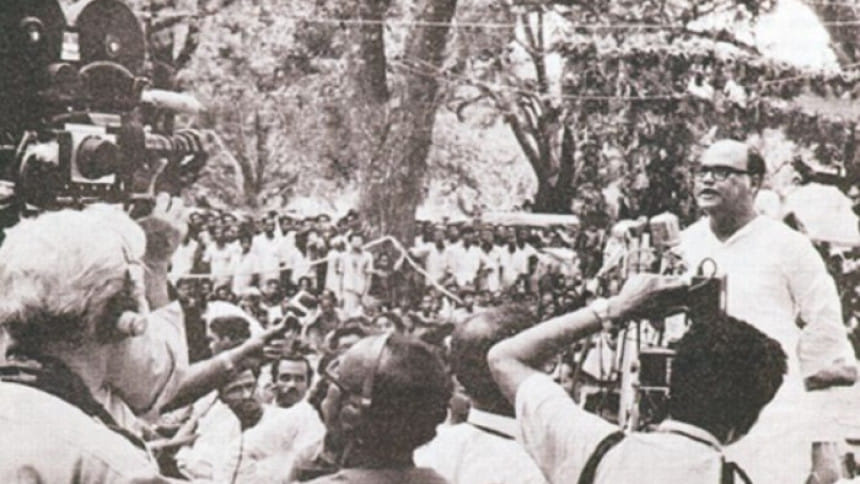Genesis of Bangladesh's Constitution

The beginning of the genocide from the night of March 25, 1971 left the Awami League (AL) leadership in a quandary. Especially as the directing hand of its leader Bangabadhu Sheikh Mujibur Rahman, who was arrested and his fate not known, was now missing. There was no clear sign of anyone else in the AL hierarchy, at least up to that point, taking control and reassuring the country that everything was on course, or soon would be. The call of duty was one that Tajuddin Ahmad heard loud and clear.
Tajuddin Ahmad, with Amir-Ul Islam on his side, left Dhaka on the night of March 27; fleeing for days by car, boat, on foot, and even by horse, they travelled relentlessly to reach the Bangladesh-India border. It was also during this time that, according to Tajuddin Ahmad's eldest daughter Sharmin Ahmad, he came up with the idea of a provisional government. Once on Indian soil, Tajuddin Ahmad and Amir-Ul Islam, through the help of the DG of BSF, were flown to New Delhi to meet the Indian Prime Minister, Indira Gandhi. The issue that bothered him most surrounded the capacity in which he would be meeting the Indian PM.
A day before meeting the Indian PM, her senior advisor P N Haksar met Tajuddin, and during the discussions, he wanted to know if AL had already formed a government. This query led Tajuddin to assume that the Indian government did not have any knowledge of whether a government had been formed or not. Moreover, if he would provide an affirmative answer to the Indian PM, it would help the resolution that was taken in the Indian Parliament on March 31 "to help the struggle for the people of East Bengal", to take a definite and concrete shape.
From this consideration, at the outset of his meeting with the Indian PM, he informed her that right after the Pakistani crackdown, a government had been formed with Sheikh Mujibur Rahman as the President and all the members of AL's high command as ministers, and even presented himself as the Prime Minister of the said government. This instant decision of Tajuddin worked out very positively, and the Indian PM promised to provide every help for Bangladesh's struggle for independence.
Following his meeting with the Indian PM, Tajuddin held a discussion with Amir-Ul Islam and it was strongly felt that a provisional government should be formed as soon as possible, as it would strengthen our hand while dealing with the Indian authorities. While in New Delhi, Tajuddin Ahmad, with help from Amir-Ul Islam and Rehman Sobhan, drafted a speech containing the basic principles of the Liberation War, which was later aired by Akashbani Calcutta on the night of April 11, 1971.
On April 10, AL leaders held a parliamentary session with all the elected MNAs and MPs who were in India at that time, in a jungle tent somewhere at the source of the river Teesta, and approved the formation and composition of the provisional government. The MNAs and MPAs also formed a constituent assembly in exile and approved the Proclamation of Independence as drafted by Amir-Ul Islam two days earlier on April 8.
Then came the momentous occasion. Efforts were underway to locate an ideal place for the formal inauguration of the new government. It was decided that the Bangali government would be formed on Bangladeshi soil and not in India so that it would be accepted and interpreted as the will of the Bangalis, and not be perceived as an Indian conspiracy.
Amidst great rejoicing, with the presence of some 50 foreign journalists, the formal inauguration took place at a mango grove of a small village called Baidyanathtala in Meherpur, Kushtia. Baidyanathtala also had a symbolic significance. The battleground of the mango grove in Plassey, the scene of British victory over the Nawab of Bengal, in the summer of 1757 was not very far from Baidyanathtala. Now interestingly, in the summer of 1971, another mango grove in the vicinity became the place where the sovereign state of Bangladesh was inaugurated, erasing the humiliation of two hundred years of alien rule. The Constituent Assembly issued the formal proclamation of independence, which was read by Prof. Yusuf Ali (MNA). To make Tajuddin's first radio speech in consonant with the formation of a legal government, the Proclamation of Independence was backdated to April 10, a date that came to be known as the day of the Mujibnagar Declaration of Independence.
The Mujibnagar Declaration was the legal basis of our Liberation War, and was later incorporated as the sixth schedule (Article 150 (2)) of the Constitution. On the declaration of independence it was said: "Whereas in the facts and circumstances of such treacherous conduct Bangabandhu Sheikh Mujibur Rahman, the undisputed leader of 75 million of people of Bangladesh, in due fulfillment of the legitimate right of self-determination of the people of Bangladesh, duly made a declaration of independence at Dacca on March 26, 1971, and urged the people of Bangladesh to defend the honour and integrity of Bangladesh."
AL's six-point programme was a Magna Carta for quasi-independence, not for absolute independence. To justify the transition from the mandate of quasi to complete independence, the Mujibnagar Declaration contained nine "whereas" clauses that included: "Whereas instead of fulfilling their promise ... Pakistan authorities declared an unjust and treacherous war."
On the presidency of the Republic, it said: "In order to ensure for the people of Bangladesh equality, human dignity and social justice, declare and constitute Bangladesh to be a sovereign People's Republic and thereby confirm the declaration of independence already made by Bangabandhu Sheikh Mujibur Rahman, and do hereby affirm and resolve that till such time as a Constitution is framed, Bangabandhu Sheikh Mujibur Rahman shall be the President of the Republic and that Syed Nazrul Islam shall be the Vice-President of the Republic, and that the President shall be the Supreme Commander of all the Armed Forces of the Republic." In the exercise of power conferred by the proclamation, the Acting President Syed Nazrul Islam issued the Laws Continuance Enforcement Order, as drafted also by Amir-Ul Islam, along with the proclamation of independence to ensure the continuity of all existing laws.
The Proclamation of Independence served as the interim Constitution of Bangladesh from March 26, 1971 to December 16, 1972, and even received the status of 'Genesis of Bangladesh Constitution' as pronounced by Bangladesh's Supreme Court in the Judgment of the 8th Amendment case. It was simultaneously accompanied with the Laws Continuance Enforcement Order, both dated April 10, to come into effect from March 26, 1971. The Order permitted all laws which were in force on March 25, 1971 to be continued in Bangladesh and be subject to future change by competent legislature or other competent authority when necessary.
After the formal swearing-in ceremony, Tajuddin Ahmad renamed Baidyanathtala to 'Mujibnagar'. He also declared that the town would be the official capital of Bangladesh. Once the cabinet was announced and oath of office administered, Tajuddin Ahmad, referring to 1757's Battle of Plassey, said, "In one mango grove we lost our independence, in another mango grove we have regained it."
In his first public address following the swearing-in ceremony, Prime Minister Tajuddin Ahmed concluded: "By God's grace and our unconquerable spirit, every last man of this army of occupation will either be driven out or destroyed by the people of Bangladesh. Out of the ashes, a new Bangladesh will rise committed to peace, democracy and social justice resting on secure foundations of creed, language, culture and race and held together by the shared experience of a struggle which must take its place in the epic struggles of our time".
The formation of the Mujibnagar government gave the total war effort a fuller meaning. It cemented the unity of the people, brought the world closer to the existence of freedom fighters, made the war efforts bloom in its full focus, and realised the presence of Bangladesh in the comity of nations. It was in effect a formal introduction to the rest of the world of the nature of the political leadership that was set to guide the nation into a concerted and organised war of national independence.
The writer is the Convenor of the Canadian Committee for Human Rights and Democracy in Bangladesh.

 For all latest news, follow The Daily Star's Google News channel.
For all latest news, follow The Daily Star's Google News channel. 



Comments